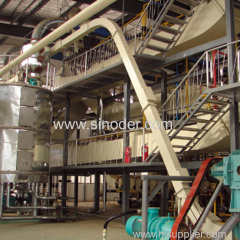Cottonseed
protein dephenolization production line fulfills continuous and
mechanized production of cottonseed protein with CE, BV, and ISO 9001
approval. This international advanced cottonseed protein technology
designed compact process of crushing, immersing, drying with stable
operation, low solvent consumption, low production cost, high oil yield,
complete dephenolization, high quality cottonseed protein and low
residual methanol content etc.
Dephenolized cottonseed protein is a high quality feed protein material.
Due to the use of a new process such as low temperature leaching and
two solvent stepwise extraction in the process, the denaturation of the
protein is greatly reduced, and the gossypol is taken out, so that the
nutritional level is improved.
The free gossypol content of dephenolated cottonseed protein product is
less than or equal to 400ppm, the crude protein content is above 50%,
and the ratio of total amino a-cid to crude protein is 95%, which can
replace animal protein such as soybean meal, corn protein powder and
fish meal. Widely Used in livestock and aquaculture feeds.
Cottonseed Protein Dephenolization Technology:
The patent technology of
cottonseed protein dephenolization equipment obtains protein through
process of low temperature pretreatment, oil extraction, dephenolization
and other sections.
Secondary extraction
dephenolization technology adopts two kinds of solvent to respectively
extract oil and gossypol to ensure oil quality and complete
dephenolization (free gossypol ≤0.04%, lower than food grade cotton
protein free gossypol content regulated in WHO/FAO/INICEF international
organization, and not more than 0.06%), while Phyllotreta enzymes
generated by storage course of cottonseed is removed.
The wet meal with solvent is not
processed but directly extracted to remove gossypol after oil
extraction, which reduces consumption, and avoid thermal denaturation of
the protein, and keeps product quality stable.
Cottonseed detoxification methods in China include chemical method,
biological fermentation method, and solvent extraction method.
Chemical method is to add metal ions to cotton meal to form a complex.
The disadvantage is that the formed complex is still retained in cotton
meal. The color is dark and the palatability is poor. Biological
fermentation uses yeast to convert gossypol in cotton meal. The process
conditions are difficult to control, and the nutritional value and
effect are not guaranteed.
The solvent extraction method uses the different solubility of gossypol
in a certain solvent, extracts of gossypol and oil, and chooses a
reasonable solvent to achieve its purpose, that is, the oil extraction
rate is high, and the degree of protein destruction is the lowest. And
gossypol is separated for reuse.
This process adopts our company's most advanced cottonseed dephenolized patented production process.
This process inherits and develops the advantages of the solvent
extraction method (to avoid as much as possible the thermal denaturation
of protein and the combination of protein and free gossypol).
Two solvents are used. The step-by-step extraction of oil and gossypol
guarantees thorough dephenolization and the quality of the oil, and has
perfect technological measures to ensure the separation and recovery of
solvents, low solvent consumption, and avoiding thermal denaturation of
proteins; making the product good in quality and nutritional value
high.
Extraction Dephenolization Process
This process is one of the core processes, which is divided into five
parts: (1) degreasing, (2) dephenolization, (3) mixed oil filtration,
(4) mixed liquid filtration, (5) material transportation quantitative in
and out transportation system.
Degreasing and dephenolization are completed in an extractor. The
filtering system uses a vertical basket automatic filter. The key
equipment includes: Extracting dephenolizer, filter, pump, scraper
conveyor, and material level control system.
Protein dissolution is mainly divided into two parts: protein drying and solvent recovery.
In order to improve the efficiency of protein drying, ensure the smooth
production, and improve the quality of protein, three-stage drying
technology is used for drying. The solvent recovery mainly includes
recovery and separation of two solvents. The classified solvent
separation system realizes effective separation and recycling of two
solvents.
Evaporation, stream stripping
The mixed oil is filtered through a filter, and the separated mixed oil
is fed into a salting-out tank, and the salted oil is introduced into
the first evaporator, and the mixed oil from the first evaporator is
introduced into the second evaporator, and the second evaporator is
discharged. The oil enters the stripper, and the stripped oil into the
crude oil tank is pumped to the refining workshop.
Solvent cooling and water separation section
The recovery system includes methanol recovery system and hexane recovery system.
A. Distillation process of methanol
Methanol is recovered from phenol-containing methanol and phenol-free.
The phenol-containing methanol mixture is filtered through two stages,
and then enters the rectification tower for rectification and
purification, and is cooled and recovered by the corresponding heat
exchanger for reuse.
The phenol-free methanol is independently placed in a temporary storage
tank, and is appropriately purified according to production needs and
then entered into the production line for secondary use.
B. The hexane recovery is basically the same as the traditional process.
C. Exhaust gas recovery: Exhaust gas is composed of frozen recovery and paraffin recovery.
Main economic and technical indicators
1, cottonseed quality: a, A grade of cottonseed; b, light seed,
cottonseed residual rate of 3 ~ 5%; c, moisture 8 ~ 12%, d, no mixed
grade.
2, solvent quality: a, 6# solvent oil, in line with national standards.
b. The quality of methanol is in line with national standards.
3. Quality of refined cottonseed oil: in line with GB1537-2003 standard.
4. Protein content ≥ 50%.
5. Free gossypol content<0.04%.
6, protein residual oil ≤ 1.5%.
7, protein residue: No. 6# solvent ≤ 0.05%, methanol content ≤ 0.08%.
8, water ≤ 6.
9, comprehensive solvent consumption: ≤ 10kg / ton cottonseeds (No. 6# solvent oil + methanol)


